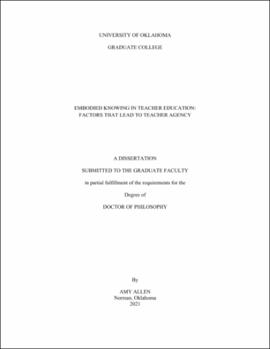| dc.contributor.advisor | Brugar, Kristy | |
| dc.contributor.author | Allen, Amy | |
| dc.date.accessioned | 2021-12-01T21:02:31Z | |
| dc.date.available | 2021-12-01T21:02:31Z | |
| dc.date.issued | 2021-12-18 | |
| dc.identifier.uri | https://hdl.handle.net/11244/331297 | |
| dc.description.abstract | The purpose of this paper is to develop an initial theory explaining why some teachers are able to learn (as evidenced by implementation or integration into their practice) good technique and good theory while others cannot. Using a qualitative study design framed by notions of intimate scholarship and data analysis rooted in the traditions of grounded theory, I provided a series of three professional development sessions for elementary school teachers at a private school, four of whom engaged in additional interviews with me deconstructing their beliefs about a specific instructional technique, using discussion based teaching strategies, and three of whom participated in three observation/interview cycles during which they attempted to implement the strategy presented during the professional development session. Data was collected through in-depth interviews, classroom observations, and analytic memos, then analyzed using a grounded theory approach. During analysis of the data, four factors that directly relate to the research question emerged, including preparation, commitment, relationship, and agency. These are described in detail, and explanations and excerpts from the data are used to illustrate the factors holistically as well as detailing more nuanced aspects of each factor. These categories contribute to previous research on professional development in teacher education at large and in the more specific field of social studies professional development by offering a framework, Embodied Knowing in Teacher Education, that builds on existing theories of the ways teachers learn. Implications of these findings for teacher educators, school leaders and administrators, and instructional coaches as well as independent consultants or curriculum publishers developing professional development programs are also examined. | en_US |
| dc.language | en_US | en_US |
| dc.rights | Attribution-NonCommercial-NoDerivatives 4.0 International | * |
| dc.rights.uri | https://creativecommons.org/licenses/by-nc-nd/4.0/ | * |
| dc.subject | Education, Teacher Training. | en_US |
| dc.subject | Education, Curriculum and Instruction. | en_US |
| dc.subject | Education, Elementary. | en_US |
| dc.title | Embodied knowing in teacher education: factors that lead to teacher agency | en_US |
| dc.contributor.committeeMember | Peltier, Corey | |
| dc.contributor.committeeMember | Houser, Neil | |
| dc.contributor.committeeMember | Torres, Heidi | |
| dc.contributor.committeeMember | Hill, Crag | |
| dc.date.manuscript | 2021 | |
| dc.thesis.degree | Ph.D. | en_US |
| ou.group | Jeannine Rainbolt College of Education::Department of Instructional Leadership and Academic Curriculum | en_US |
| shareok.orcid | 0000-0001-6551-545X | en_US |

